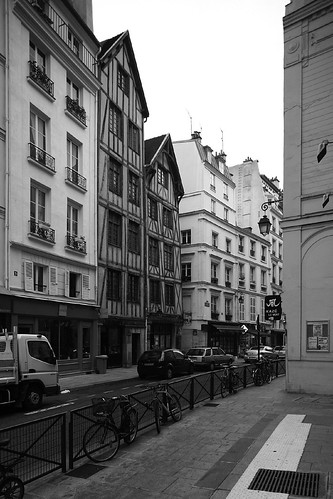Six segments, a reader might credibly say, on this slight volume is really dragging matters out a bit too much. As I have stated elsewhere however it does help me to remember certain things I have read, and certain thoughts which I have had at the time, much better than I would have otherwise, which I believe generally contributes to the better organization and power of association in my mind. So I stick to the format.
The rest of the essays in the book are about the author's experiences in postwar Europe, especially Paris, which is pretty titillating terrain for me, though I have kind of given up Paris, for the moment at least, as a place with which I can ever really have anything to do. The essay is typical heady-young-American-goes-to-Paris fare, the twist offered by the author's being black largely mitigated by the Parisians having a sterotype of black Americans ("the French...consider that all Negroes arrive from American, trumpet-laden and twinkle-toed, bearing scars so unutterably painful that all the glories of the French Republic may not suffice to heal them") as convenient for their purposes as that which they have of white Americans. He discovers that an American "needs to establish himself in relation to his past...that this depthless alienation from oneself and one's people is, in sum, the American experience." He expresses the hope that "What time will bring Americans at last is their own identity." He finds that Paris has wretched plumbing and dirt, and that whatever exciting might be happening there is largely inaccessible to him, because he has not the acquaintance with the language, the tradition, the history, the affection for the French people, to enter into any very close contact with the main currents of life in it. "The sordid French hotel room, so admirably detailed by the camera, speaking, in its quaintness, and distance, so beautifully of romance, undergoes a seachange, becomes a room positively hositle to romance, once it is oneself, and not Jean Gabin, who lives there....Paris is, according to its legend, the city where everyone loses his head, and his morals, lives through at least one histoire d'amour, ceases, quite, to arrive anywhere on time, and thumbs his nose at the Puritans...It is limited, as legends are limited, by being--literally--unlivable, and by referring to the past." I have found something of this sort to be true myself, though I always assumed it was just me--the people who matter still more or less live the legend--they must, for it still exists. They may not be ultimately any happier, but the sounds, the tastes, the frisson that constitute the total Paris ideal are certainly there to be found, somewhere.
 "Though the students of any nation, in Paris, are allowed irresponsibility, few seem to need it as desperately as Americans seem to need it."
"Though the students of any nation, in Paris, are allowed irresponsibility, few seem to need it as desperately as Americans seem to need it."American identity in the 50s as seen by the French: "the Marshall Plan, Hollywood, the Yankee dollar, television...Senator McCarthy". Needless to say, the American student only wants to be liked "as a person...which makes perfect sense to him, and none whatever to the European". Plus ca change, et al.
"One very often finds in this category that student whose adaptation to French life seems to have been most perfect, and whose studies--of French art, or the drama, the language, or the history--give him the greatest right to be here. This student has put aside chewing gum forever, he eschews the T-shirt, and the crew cut, he can only with difficulty be prevailed upon to see an American movie, and it is so patent that he is actually studying that his appearance at the cafe tables is never taken as evidence of frivolity..." The American of this type is in an unenviable spot, for he can never win, never attain fullness as a person, which is what any man seeks above all. Since I am afflicted with something of this condition, I have always considered it among the foremost of our long term national problems, the development of reasonably capable people into more fully realized, self-contained human beings. This is a serious flaw in the culture.
"Thus they lose what they had so bravely set out to find, their own personalities, which, having been deprived of all nourishment, soon cease, in effect, to exist"
"I considered the French an ancient, intelligent, and cultured race, which indeed they are. I did not know, however...that there is a limit to the role of intelligence in human affairs; and that no people come into possession of a culture without having paid a heavy price for it...One had, in short...to understand that a culture was not a community basket-weaving project...was something neither desirable nor undesirable in itself, being inevitable, being nothing more or lessthan the recorded and visible effects on a body of people of the vicissitudes with which they had been forced to deal.."


No comments:
Post a Comment